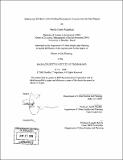Destroying old myths while building development : lessons from the Sisal Region
Author(s)
Magalhães, Marília Castelo
DownloadFull printable version (7.247Mb)
Other Contributors
Massachusetts Institute of Technology. Dept. of Urban Studies and Planning.
Advisor
Judith Tendler.
Terms of use
Metadata
Show full item recordAbstract
In 1996, the Brazilian Government implemented the Child Labor Eradication Program - PETI, a conditional cash transfer program aimed at reducing child labor by paying a stipend to families who send their working children to an extended day program. After 12 years, PETI has had its most successful implementation in a poor semi-arid region of Brazil, the Sisal Region. The existence of an associational structure in which the federal, state and local government joined efforts with local civil society institutions, mainly a NGO and local rural labor unions, enabled each institution to contribute to the project in the best way possible. As a result the Sisal Region considerably reduced child labor, provided high quality extended day programs and assisted the families involved in PETI with projects aimed at their economic independence.
Description
Thesis (M.C.P.)--Massachusetts Institute of Technology, Dept. of Urban Studies and Planning, 2008. Includes bibliographical references (leaves 64-67).
Date issued
2008Department
Massachusetts Institute of Technology. Department of Urban Studies and PlanningPublisher
Massachusetts Institute of Technology
Keywords
Urban Studies and Planning.